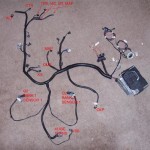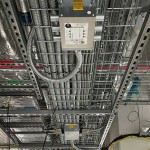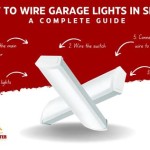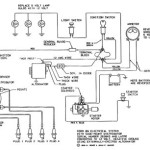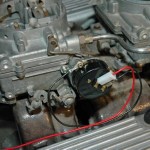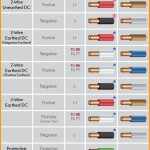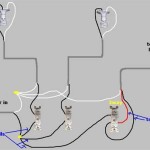Wiring a car for a trailer involves installing electrical connections between the towing vehicle and the trailer. This allows for the transfer of electrical signals, enabling the trailer’s lights, brakes, and other electrical systems to function.
The proper wiring of a car for a trailer is crucial for safe and legal towing. It ensures that the trailer’s lights are visible to other drivers, that the brakes operate effectively, and that any additional electrical accessories, such as turn signals or hazard lights, are functional. This contributes to the overall safety of the towing operation and reduces the risk of accidents.
One significant historical development in the wiring of cars for trailers was the introduction of standardized trailer connectors. These connectors, such as the 7-pin RV connector, provide a uniform interface for connecting the electrical systems of the towing vehicle and trailer, ensuring compatibility and reliability. Additionally, advancements in trailer brake control systems have improved the safety and stability of towing operations, enhancing overall driving experience and safety.
The process of wiring a car for a trailer involves various essential aspects that contribute to the overall safety, functionality, and compliance of the towing setup. Understanding these aspects is crucial to ensure a successful and trouble-free towing experience.
- Electrical Compatibility: Matching the electrical systems of the towing vehicle and trailer is essential for proper functioning of lights, brakes, and other electrical components.
- Connector Type: Selecting the appropriate trailer connector, such as a 4-pin or 7-pin connector, ensures compatibility and a secure electrical connection.
- Wiring Harness: A custom-made or vehicle-specific wiring harness simplifies the installation process and reduces the risk of electrical issues.
- Circuit Protection: Fuses or circuit breakers protect the electrical system from overloads and short circuits, preventing damage to components.
- Grounding: Establishing a proper grounding connection ensures the safe and efficient flow of electrical current.
- Trailer Brake Control: Integrating a trailer brake control system enhances safety by allowing the driver to control the trailer’s brakes independently.
- Lighting Compliance: Ensuring that the trailer’s lights, including turn signals, brake lights, and running lights, comply with legal requirements.
- Wire Gauge: Using the correct wire gauge for the electrical load ensures adequate current flow and prevents overheating.
- Professional Installation: Seeking professional assistance for wiring a car for a trailer is recommended for safety and reliability.
- Maintenance and Inspection: Regular maintenance and inspection of the electrical system help identify and address potential issues early on.
These aspects are interconnected and play a vital role in the safe and effective operation of a trailer. Proper wiring ensures that the electrical signals are transmitted reliably, allowing for communication between the towing vehicle and the trailer, and enabling the trailer’s systems to function as intended. By considering these aspects and adhering to best practices, individuals can ensure a successful and compliant towing experience.
Electrical Compatibility
In the context of wiring a car for a trailer, electrical compatibility plays a crucial role in ensuring the proper operation of various electrical systems, including lights, brakes, and other components. Matching the electrical systems of the towing vehicle and trailer involves aligning their voltage, amperage, and grounding requirements to enable seamless communication and functionality.
- Voltage Compatibility: The towing vehicle and trailer must have compatible voltage systems. Typically, most vehicles and trailers operate on a 12-volt DC electrical system. Mismatched voltage can lead to damage to electrical components or improper functioning of lights and brakes.
- Amperage Capacity: The towing vehicle’s electrical system must be able to provide sufficient amperage to power the trailer’s electrical components. Exceeding the amperage capacity can overload the system, leading to blown fuses or damage to wiring.
- Grounding: Proper grounding is essential for the safe and effective operation of the electrical system. The trailer must be securely grounded to the towing vehicle to provide a complete circuit and prevent electrical faults.
- Circuit Protection: Fuses or circuit breakers should be installed to protect the electrical system from overloads and short circuits. These devices prevent damage to wiring and components in the event of an electrical fault.
Ensuring electrical compatibility between the towing vehicle and trailer is crucial for safety and reliability. Mismatched electrical systems can lead to a range of issues, including inoperable lights, malfunctioning brakes, and potential electrical hazards. By understanding and addressing the aspects of electrical compatibility, individuals can ensure that their towing setup operates safely and efficiently.
Connector Type
When wiring a car for a trailer, selecting the appropriate connector type is crucial for ensuring compatibility and a secure electrical connection. Trailer connectors come in various configurations, each designed to accommodate specific electrical requirements and applications. Understanding the different types of connectors and their applications is essential for a successful and safe towing experience.
- Connector Design: Trailer connectors vary in design, with common types including 4-pin, 5-pin, 6-pin, and 7-pin connectors. Each connector type has a specific number of terminals or pins that correspond to different electrical functions, such as lighting, brakes, and auxiliary power.
- Wiring Configuration: The wiring configuration of a trailer connector determines how the electrical signals are transmitted between the towing vehicle and the trailer. Proper wiring is essential to ensure that the trailer’s lights, brakes, and other electrical components function correctly.
- Compatibility: Selecting a trailer connector that is compatible with both the towing vehicle and the trailer is essential. Mismatched connectors can lead to improper electrical connections, malfunctioning components, or even electrical hazards.
- Durability: Trailer connectors are exposed to harsh conditions, including moisture, dirt, and road debris. Choosing a connector made from durable materials and designed to withstand these conditions ensures a reliable electrical connection over time.
Understanding the different aspects of connector type is crucial for selecting the appropriate connector for a specific towing application. Proper connector selection ensures a secure and reliable electrical connection, enabling the safe and efficient operation of the trailer’s electrical systems. By considering these factors, individuals can ensure that their towing setup is compliant with safety regulations and operates as intended.
Wiring Harness
In the context of wiring a car for a trailer, a wiring harness plays a crucial role in simplifying the installation process and minimizing the risk of electrical issues. A wiring harness is a pre-assembled set of wires and connectors designed to connect the electrical systems of the towing vehicle and the trailer. It provides a standardized and efficient way to establish the necessary electrical connections, ensuring proper communication and functionality between the two.
One of the primary benefits of using a wiring harness is its ability to simplify the installation process. By utilizing a pre-made harness, individuals can avoid the hassle of individually sourcing and connecting wires, which can be time-consuming and prone to errors. The harness is designed to be plug-and-play, allowing for a straightforward and efficient installation. This reduces the chances of incorrect connections or mismatched wiring, which could lead to electrical malfunctions or safety hazards.
Furthermore, a wiring harness helps reduce the risk of electrical issues by ensuring proper connections and protection. The harness is typically constructed using high-quality materials and components, including corrosion-resistant connectors and insulated wires. This helps prevent electrical shorts, voltage drops, and other issues that can arise from poorly made connections or exposed wiring. Additionally, the use of a wiring harness eliminates the need for splicing or soldering wires, which can introduce potential points of failure.
In real-life applications, wiring harnesses are commonly used in various towing setups, including those involving utility trailers, boat trailers, and recreational vehicles (RVs). By utilizing a custom-made or vehicle-specific wiring harness, individuals can ensure that the electrical systems of their towing vehicle and trailer are properly integrated, allowing for safe and reliable operation of lighting, brakes, and other essential functions.
In summary, the use of a wiring harness when wiring a car for a trailer offers significant advantages in terms of simplifying the installation process and reducing the risk of electrical issues. By providing a pre-assembled and standardized solution, wiring harnesses ensure proper connections, eliminate the need for complex wiring, and enhance the overall safety and reliability of the towing setup.
Circuit Protection
In the context of wiring a car for a trailer, circuit protection plays a crucial role in safeguarding the electrical system from potential damage caused by overloads and short circuits. Overloads occur when excessive current flows through a circuit, while short circuits arise when current takes an unintended path, often due to faulty wiring or component failure. Both scenarios can lead to overheating, electrical fires, and damage to sensitive electronic components.
- Fuses: Fuses are sacrificial devices designed to break the circuit and prevent excessive current flow in the event of an overload or short circuit. They are typically made of a thin wire that melts and breaks the circuit when the current exceeds a predetermined threshold.
- Circuit Breakers: Circuit breakers are reusable protective devices that automatically trip and interrupt the circuit when an overload or short circuit is detected. They can be reset once the fault is cleared, eliminating the need for fuse replacement.
- Wiring Protection: Circuit protection devices help safeguard the integrity of the wiring system by preventing overheating and damage to wires. Overheated wires can lead to insulation breakdown, short circuits, and potential fire hazards.
- Component Protection: By preventing excessive current flow, circuit protection devices shield sensitive electrical components, such as lights, brakes, and control modules, from damage or burnout.
Circuit protection is an essential aspect of wiring a car for a trailer, ensuring the safe and reliable operation of the electrical system. Proper selection and installation of fuses or circuit breakers, along with regular maintenance and inspection, can prevent electrical failures, protect valuable components, and enhance the longevity of the towing setup.
Grounding
In the context of wiring a car for a trailer, grounding plays a critical role in ensuring the safe and efficient operation of the electrical system. Grounding provides a path for electrical current to return to its source, completing the circuit and allowing electricity to flow properly. Without a proper grounding connection, electrical faults, malfunctions, and safety hazards can occur.
Establishing a proper grounding connection involves creating a low-resistance path between the trailer’s electrical system and the chassis or frame of the towing vehicle. This connection allows stray electrical current to safely dissipate, preventing voltage spikes, electrical shorts, and potential damage to components. Grounding also helps protect against electrical shock and ensures the proper functioning of electrical devices, such as lights, brakes, and control modules.
In real-life applications, grounding is achieved through the use of grounding wires or straps. These conductors are typically made of copper or aluminum and are connected to the trailer’s frame and the towing vehicle’s chassis or battery negative terminal. Proper installation involves securing the grounding wires or straps with bolts or clamps to ensure a solid and reliable connection.
The practical significance of understanding grounding in the context of wiring a car for a trailer lies in its impact on safety and reliability. A properly grounded electrical system minimizes the risk of electrical fires, protects against electrical shock, and ensures the correct operation of essential trailer components. Furthermore, proper grounding helps prevent premature component failure and extends the lifespan of the towing setup.
In summary, grounding is an essential aspect of wiring a car for a trailer, ensuring the safe and efficient flow of electrical current. Establishing a proper grounding connection provides a path for stray electrical current to dissipate, preventing electrical faults and safeguarding both the towing vehicle and the trailer. Understanding the importance of grounding and implementing it correctly is crucial for a reliable and trouble-free towing experience.
Trailer Brake Control
The integration of a trailer brake control system plays a crucial role in the context of “Wiring A Car For A Trailer”. It introduces an essential safety feature that empowers drivers with independent control over the trailer’s braking system. This capability is particularly important when towing heavy trailers or navigating challenging road conditions.
Trailer brake control systems operate by synchronizing the braking action between the towing vehicle and the trailer. They utilize electrical signals transmitted through the wiring harness to actuate the trailer’s brakes independently. This allows drivers to apply appropriate braking force to the trailer, regardless of the load or terrain, ensuring stability and preventing jackknifing or trailer sway.
In real-life scenarios, trailer brake control systems prove invaluable in various situations. When towing a heavy trailer, the ability to independently control the trailer’s brakes helps prevent excessive strain on the towing vehicle’s braking system. This is especially beneficial when descending steep grades or coming to sudden stops.
Furthermore, trailer brake control systems enhance safety in challenging weather conditions such as rain, snow, or ice. By allowing drivers to modulate the trailer’s braking force, they can maintain stability and reduce the risk of skidding or loss of control.
In summary, the connection between “Trailer Brake Control: Integrating a trailer brake control system enhances safety by allowing the driver to control the trailer’s brakes independently.” and “Wiring A Car For A Trailer” underscores the critical importance of incorporating a trailer brake control system when wiring a car for towing. It provides drivers with the necessary control and safety features to manage the braking of both the towing vehicle and the trailer effectively, ensuring a stable and secure towing experience.
Lighting Compliance
In the context of “Wiring A Car For A Trailer”, lighting compliance holds paramount importance, as it directly relates to the safety and legality of towing operations. Adhering to legal requirements for trailer lighting ensures that the trailer’s presence and maneuvers are clearly visible to other motorists, pedestrians, and law enforcement, promoting road safety and preventing accidents.
- DOT-Approved Lighting: Trailers must be equipped with lighting components that meet the specifications set by the Department of Transportation (DOT). These include specific requirements for the placement, visibility, and color of turn signals, brake lights, and running lights.
- Reflective Markings: In addition to functional lights, trailers must also display reflective markings, such as conspicuity tape or reflective triangles, to enhance their visibility, especially at night or in low-light conditions.
- Proper Wiring: The electrical wiring connecting the trailer’s lights to the towing vehicle must be properly installed and maintained to ensure reliable operation. This includes using the appropriate wire gauge, connectors, and grounding to prevent electrical malfunctions and ensure proper signal transmission.
- Load-Matching: The electrical system of the towing vehicle must be capable of handling the additional electrical load imposed by the trailer’s lighting system. This may require upgrading the alternator or installing a heavy-duty wiring harness to provide sufficient power.
By ensuring lighting compliance, individuals can not only avoid legal penalties but also contribute to safer and more responsible towing practices. Properly functioning and compliant lighting systems allow other road users to anticipate the trailer’s movements, reducing the risk of collisions and enhancing overall road safety.
Wire Gauge
In the context of “Wiring A Car For A Trailer,” selecting the appropriate wire gauge is crucial to ensure the safe and reliable operation of the trailer’s electrical system. Wire gauge, measured in American Wire Gauge (AWG), determines the thickness of the wire and its current-carrying capacity. Using the correct wire gauge for the electrical load ensures adequate current flow to power the trailer’s lights, brakes, and other electrical components without overheating or causing damage to the wiring.
Electrical current flowing through a wire generates heat due to resistance. Oversized wires have less resistance and can handle higher current without overheating, while undersized wires have higher resistance and can overheat under the same load, leading to insulation damage, voltage drop, and potential electrical fires.
In a real-life scenario, using the correct wire gauge is essential to prevent overheating and electrical malfunctions in the trailer’s wiring harness. For instance, the electrical system of a large travel trailer may require a heavier wire gauge, such as 10 AWG or 12 AWG, to handle the increased electrical load compared to a smaller utility trailer that may use 14 AWG or 16 AWG wires.
Understanding the importance of wire gauge allows individuals to select the appropriate wiring components and avoid potential electrical hazards. Proper wire gauge selection ensures that the trailer’s electrical system functions as intended, providing reliable power to all its components and promoting safe towing practices.
Professional Installation
Within the context of “Wiring A Car For A Trailer”, professional installation plays a crucial role in ensuring the safety and reliability of the electrical connection between the towing vehicle and the trailer. Entrusting this task to qualified professionals offers numerous advantages, from selecting the appropriate components to adhering to electrical standards and regulations.
- Electrical Expertise: Professional installers possess the knowledge and experience to navigate the complexities of automotive electrical systems. They can identify and resolve potential issues, ensuring that the trailer’s electrical components receive the correct power and signals.
- Component Selection: Choosing the right electrical components, such as wires, connectors, and fuses, is essential for a safe and functional towing setup. Professionals can recommend and source high-quality components that meet the specific requirements of the towing vehicle and trailer.
- Compliance with Standards: Professional installers are familiar with industry standards and regulations governing trailer wiring. They ensure that the installation complies with these standards, minimizing the risk of electrical hazards or legal non-compliance.
- Troubleshooting and Maintenance: In the event of electrical issues, professional installers can quickly diagnose and resolve problems, ensuring minimal downtime and maintaining the safety and reliability of the towing setup.
While do-it-yourself wiring may seem like a cost-effective option, the potential risks and consequences of improper installation can outweigh any perceived savings. Professional installation provides peace of mind, knowing that the trailer’s electrical system is safe, reliable, and compliant with industry standards.
Maintenance and Inspection
Within the context of “Wiring A Car For A Trailer”, regular maintenance and inspection of the electrical system play a crucial role in ensuring the safety, reliability, and longevity of the towing setup. Proactive maintenance helps identify and address potential issues early on, preventing minor problems from escalating into major failures.
Electrical systems in trailers are subject to wear and tear, exposure to the elements, and potential damage from road vibrations. Regular maintenance involves periodic checks of all electrical components, including wiring, connectors, lights, and brakes. These inspections can reveal loose connections, corrosion, damaged wires, or other issues that could compromise the electrical system’s functionality.
Early detection of potential issues allows for timely repairs or replacements, minimizing the risk of electrical malfunctions, breakdowns, or even accidents. For example, identifying and addressing a loose ground connection can prevent electrical shorts or fires, while replacing a failing light bulb ensures the trailer’s visibility and safety on the road.
Moreover, regular maintenance can extend the lifespan of the electrical system by preventing premature deterioration. By proactively identifying and resolving minor issues, individuals can avoid costly repairs or replacements in the future and maintain the optimal performance of their towing setup.
In summary, regular maintenance and inspection of the electrical system are essential aspects of “Wiring A Car For A Trailer”. By addressing potential issues early on, individuals can ensure the safety, reliability, and longevity of their towing setup, preventing unexpected breakdowns and costly repairs.









Related Posts

